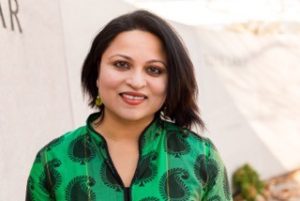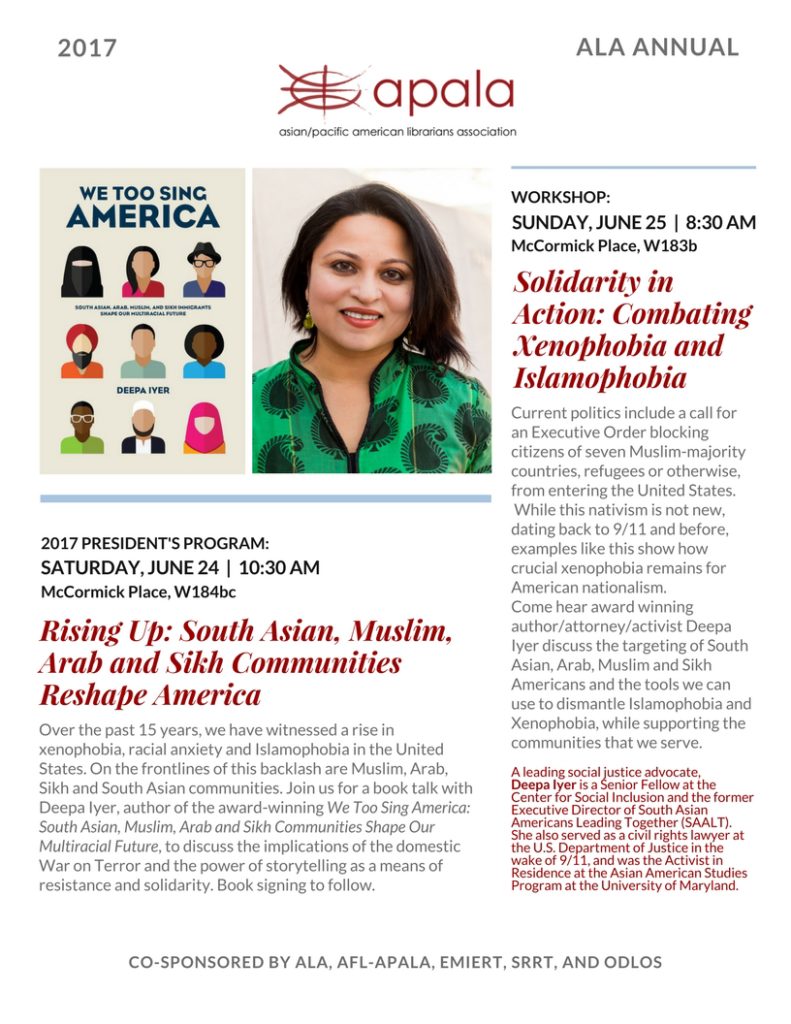 This letter was published as part of Letters to the Revolution – an online platform where leading artists and activists from marginalized communities were asked to write letters of strength and focus in light of the new administration of the United States government. To read more letters like this one, please go to letterstotherevolution.com
This letter was published as part of Letters to the Revolution – an online platform where leading artists and activists from marginalized communities were asked to write letters of strength and focus in light of the new administration of the United States government. To read more letters like this one, please go to letterstotherevolution.com
In its entirety, this letter is reprinted with permission from the author and the curators of Letters.
To my younger South Asian sister-activist-warriors:
I see you.
You’re outraged and determined.
You are ready to build this resistance, to be on the frontlines, to give voice to the struggle.
Because this is personal. It is about our people, our families, our communities, ourselves.
For 15 years, Muslim, South Asian and Arab communities have been in the midst of an unprecedented and relentless backlash. Our collective community history since 9/11 includes being subjected to hate violence while praying at a Sikh gurdwara, attending school and spending time inside our own homes. It includes being spied on while participating in Muslim student association meetings and playing cricket and soccer at public parks in Brooklyn and Queens. It includes being required to register with immigration authorities and face detentions and deportations.
Even though our communities have been confronting and surviving backlash and criminalization in the 15 years since 9/11, our lives, identities and futures are at stake like never before. In the weeks since the electoral college made Trump the president of the United States, over 1,000 anti-bias incidents have been reported and documented. As though this hostile environment were not enough, there is more coming down the road. Plans for a Muslim registry, the deportations of undocumented people, and the appointments of people who have been openly connected with White nationalist and anti-Muslim views are not wait-and-see possibilities. They are realities under the coming Trump Administration.
This is not just someone else’s story. It is deeply personal to you and me. It hits close to home. When we talk about hate violence, we are talking about our younger sisters and brothers who might be subjected to bullying and assault in classrooms and on playgrounds, and about our uncles and aunties who worry that the mosques, gurdwaras and temples they helped to establish will be sites of vandalism and violence. When we talk about policies like the Muslim registry, we are not talking just about the legal violations but about the real fears of our friends who may have to line up at federal agencies to present themselves for interrogation. When we talk about surveillance, we are talking about our fathers and brothers who worry that going to the mosque can lead to entrapment charges. When we talk about deportations, we are talking about our cousins who came to America for a better life and found an intractable and inequitable immigration system.
And because this is personal, you are devoting your heart and soul and body to this moment and to the resistance. I see you, and I’m filled with appreciation and inspiration that you’re out there – building, raising your voice, and staying woke and vigilant. And, I also see a past shade of myself in you.
When I was 28, the 9/11 attacks happened. I remember feeling shocked and confused and scared. In the 48 hours after, I also heard a very clear inner call to action, one that would shape the next 15 years of my life. In that time, I’ve learned more than a few lessons – derived from many, many mistakes and detours – about sustenance during times of crisis and struggle. This journey you have committed to is long, and it’s normal and natural to become weary.
Here are some markers to guide your way, drawn from my own personal experience and offered with humility and love.
Get Clear about Your Role.
It’s natural to want to be involved with multiple efforts, organizations, and networks during this time, and to want to speak up about the range of threats coming our way. But this moment requires us to get focused and clear, not scattered and confused. Base your role in the movement by understanding what the needs are in our communities, and by engaging in a process of self-inquiry: What am I good at and what do I enjoy doing? Who can I influence? What do I not know, and how can I seek out that knowledge? How can I remain connected to the communities I care deeply about in a real, authentic way, and not just from a distance? How and where can I be of service, from that place of skill and joy and connection?
For example, if you don’t like to fundraise, then don’t start an organization and become its director (also an ongoing note to self). On the other hand, if have the skills and enjoy making know-your-rights presentations to community members, then focus on conducting a series of information exchanges at a local place of worship. Are you interested in telling stories, documenting movement history, conveying and translating information, creating a safe space, facilitating conversations, or changing narratives? Being clear about how we will disrupt, build bridges, and resist is a critical question that each of us must answer in this moment.
Identify Your Safety Net.
On a personal level, self-critique has always been my strength – and my greatest weakness. There’s a voice in my head that often whispers, “Should you be doing this? Is this your role? Maybe you should get out of the way.” Or my favorite: “You didn’t do that right.” Sound familiar, maybe?
I’ve learned to manage my inner critic by validating its need to speak up and relying on my safety net – a small group of people who have known me for a while, and who won’t simply “yes” me or pat me on the back or Facebook-like everything I say and do under the guise of being supportive. Instead, these are people who kindly look me in the eye and ask the tough questions about my role, about my intentions, and about my limits – and patiently, and without judgment, engage me. Find that group of four to five people who will provide you with soft landings when you fall, and who will be your gentle guides. And, do the same for someone else in your tribe of activists.
Lift each other up.
I know that we all agree with this value: sisters must look out for each other. But for some reason, social justice work, especially in the age of social media, can often feel like a high school environment. The culture of sniping, second-guessing, and sub-tweeting is toxic. I’m not immune from this culture either, and it takes tremendous discipline to stay away from engaging in it. Let’s refrain from disparaging people and holding accountability sessions on social media – and rather to simply pick up the phone and have direct conversations with people (especially if we know them), and to give each other the benefit of the doubt. And more importantly, let’s commit to lifting up our sisters every opportunity we can, whether it is to open doors for them, recommend them to others, and to mentor them. We can’t be the backbone of a movement of resistance if we are not cultivating a practice of support and care for each other.
Shine On.
In the midst of the turmoil that exists in our nation today, we still have to sparkle. Every day. It’s draining to be a woman of color right now, and to hold space for the different ways our identities are being threatened and attacked. It’s natural to feel sad, anxious, worried, scared, and helpless. I’ve felt those emotions over and over since the election.
And that’s why it is imperative to nurture the fullness of who we are as human beings. Being a social justice warrior 24/7 can prevent us from leading with a clear head and can contribute to burn-out quickly. Let’s give each other permission and inspiration to glitter, shine and sparkle.
As I wrote this letter, I was moved by Assata Shakur’s Message to My Sistas, in which she wrote to Black women: “Sisters, We have been the backbone of our communities, and we have got to be the backbone of our nation…We don’t have no time to play around.“
No, we don’t. In this struggle, let’s lead with principled resistance, self-awareness, and sparkle.
In sisterhood and solidarity,
Deepa
About the author: A leading social justice advocate, Deepa Iyer is a Senior Fellow at the
Center for Social Inclusion and the former Executive Director of South Asian Americans Leading Together (SAALT). She also served as a civil rights lawyer at the U.S. Department of Justice in the
wake of 9/11, and was the Activist in Residence at the Asian American Studies Program at the University of Maryland. She blogs at www.deepaiyer.com and tweets at @dviyer. Deepa is the author of the award-winning We Too Sing America: South Asian, Muslim, Arab and Sikh Communities Shape Our
Multiracial Future.
Join APALA, ALA-ODLOS, SRRT, and EMIERT in welcoming Deepa to the 2017 ALA Annual Conference during two programs:
- 2017 APALA President’s Program: Rising Up: South Asian, Muslim, Arab and Sikh Communities Reshape America, Saturday, June 24, 10:30 a.m. to 12 p.m., McCormick Place W184bc. Book signing to follow.
- Workshop: Solidarity in Action: Combating Xenophobia and Islamophobia, Sunday, June 25, 8:30 a.m. to 10:00 a.m., McCormick Place W183b.


